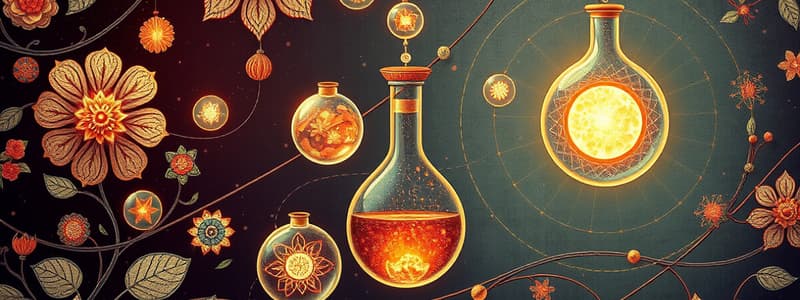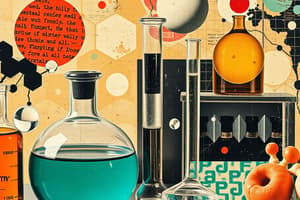Podcast
Questions and Answers
What is chemistry the science of?
What is chemistry the science of?
Molecules and their transformations.
What are the three states of matter?
What are the three states of matter?
Solid, liquid, gas.
How are substances classified in chemistry?
How are substances classified in chemistry?
Elements, compounds, and mixtures.
What is the significance of atomic mass in chemistry?
What is the significance of atomic mass in chemistry?
The scientific study of chemistry began in the 18th century.
The scientific study of chemistry began in the 18th century.
What were the two main interests that led to the development of chemistry?
What were the two main interests that led to the development of chemistry?
Which of the following are historical aspects of chemistry mentioned in the content? (Select all that apply)
Which of the following are historical aspects of chemistry mentioned in the content? (Select all that apply)
Chemistry in ancient India was known as ______.
Chemistry in ancient India was known as ______.
Flashcards are hidden until you start studying
Study Notes
Basic Concepts of Chemistry
- Chemistry studies molecules and their transformations, transcending the mere hundred elements.
- Understanding chemistry's role enhances appreciation of its applications in various life spheres.
- Recognizes three states of matter: solid, liquid, gas.
Classification of Substances
- Substances classified into elements, compounds, and mixtures.
- Practical examples of chemical change in daily life include curd formation from milk and vinegar from sugarcane juice.
- Highlights the concept of precision vs. accuracy in measurements.
Scientific Notation and Measurement
- Use of scientific notations aids in representing large or small quantities conveniently.
- Significant figures play a crucial role in accuracy of scientific calculations.
- SI base units help standardize measurements internationally.
Development of Chemistry
- Modern chemistry has roots in ancient practices, particularly alchemy, emerging around the 1300-1600 CE.
- Alchemy sought the Philosopher's Stone for metal transformation and the Elixir of Life for immortality.
Ancient Contributions
- Ancient Indian contributions to chemistry included Rasayan Shastra, significant in metallurgy and medicine.
- Knowledge existed in ancient practices, such as preparation of acids and alloys.
- Important artifacts from archaeological sites in India reveal advanced chemical processes used for making copper, silver, and other materials.
Historical Context
- Alchemy laid groundwork for modern chemistry, influencing its evolution in the 18th century.
- Chinese and Indian alchemical traditions contributed rich knowledge that predates modern scientific methods.
- Historical texts like Sushruta Samhita and Charaka Samhita highlight medical and chemical knowledge.
Key Chemical Terms
- Mole: A quantity in chemistry representing a specific number of entities (6.022 x 10²³).
- Molar mass: Mass of a mole of a substance, often expressed in grams per mole (g/mol).
- Empirical formula: A formula that gives the simplest whole number ratio of elements in a compound.
- Molecular formula: A representation showing the number and type of atoms in a molecule.
Calculations and Applications
- Importance of calculating mass percent of component elements in compounds.
- Stoichiometric calculations essential for predicting the amounts of reactants and products in chemical reactions.
Studying That Suits You
Use AI to generate personalized quizzes and flashcards to suit your learning preferences.




